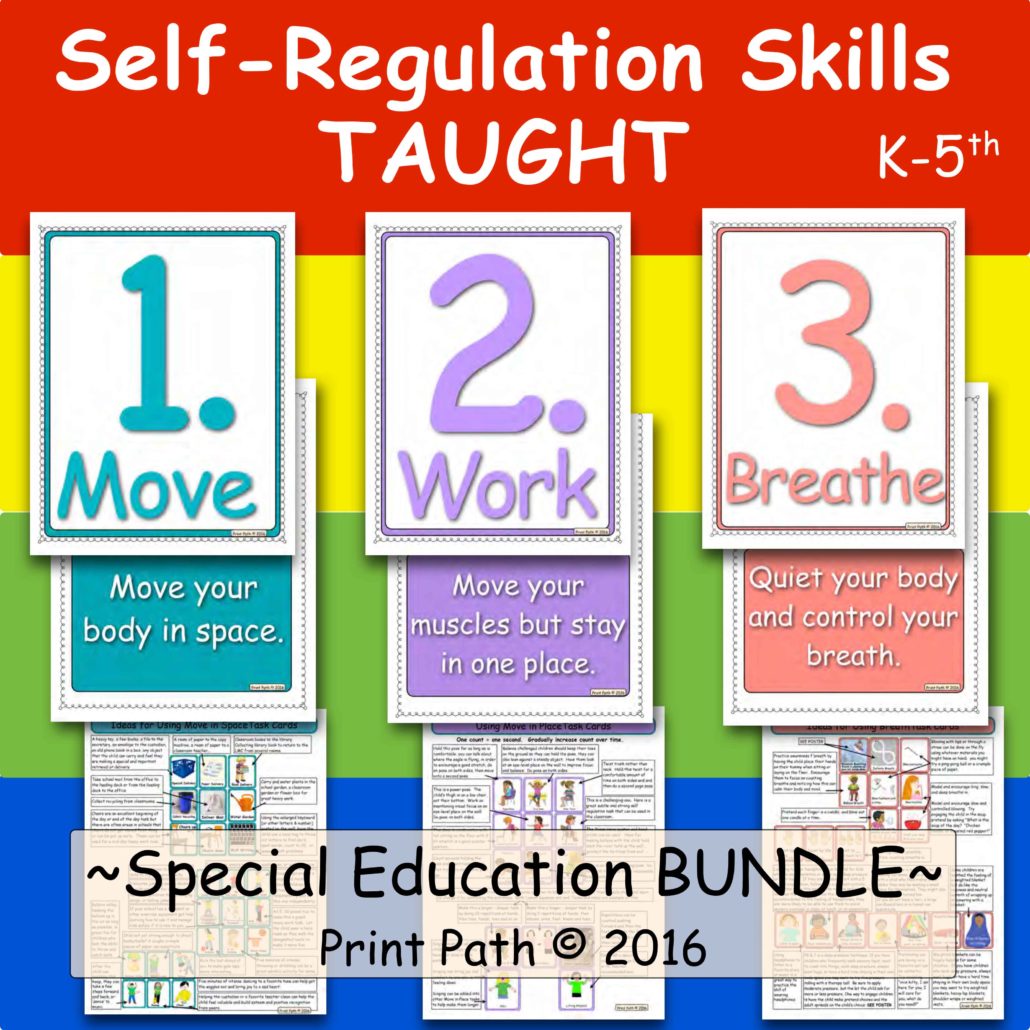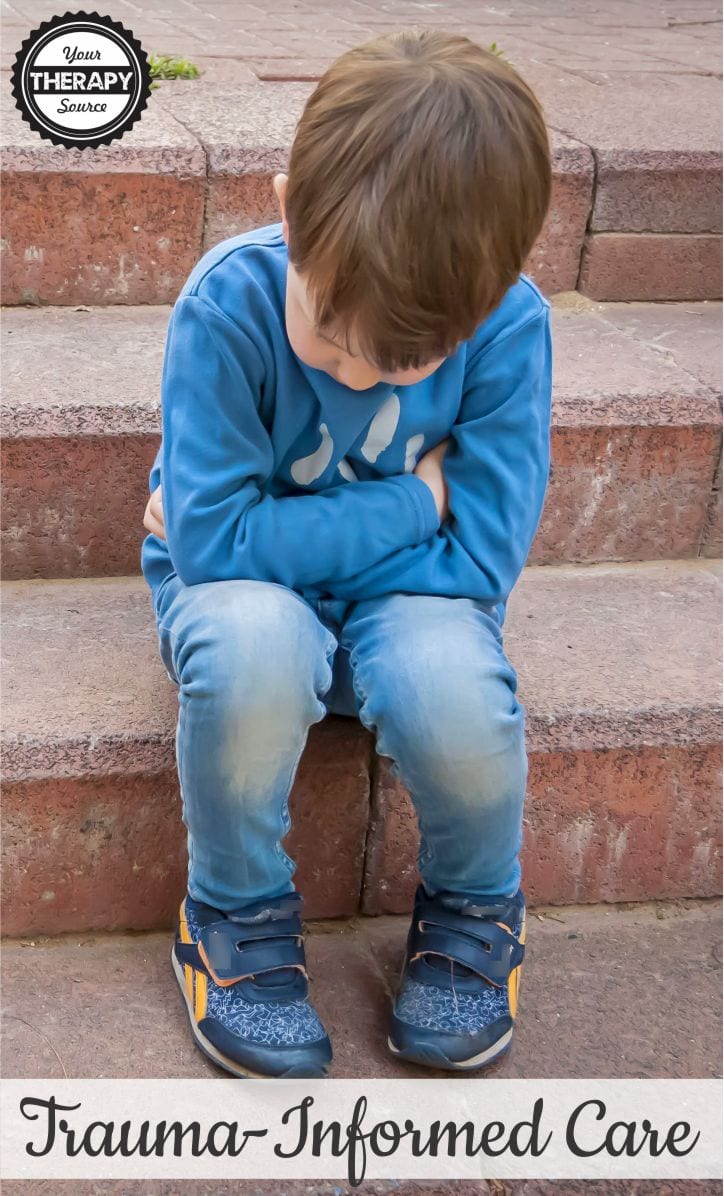Trauma Informed Care for Children in the Foster Care System

Did you know that there are hundreds of thousands of children in the US foster care system? The most recent data indicates that 690,548 children spent time in the foster care system during 2017. Most likely, if you are a school-based therapist or any school staff member you have worked with these children. Many children in the foster system demonstrate post-traumatic stress like symptoms and diagnoses which can affect their development, coping skills, emotional regulation, and relationships and attachments. Here are 7 interventions to guide Occupational Therapists to provide trauma-informed care for children in the foster care system.
Cognitive Behavioral Therapy
Cognitive and behavioral treatments are the most commonly used interventions to address trauma. The goal of this type of intervention is to reduce the overgeneralization of fears by increasing the ability to discriminate, as well as increase awareness toward their maladaptive beliefs, and establish more realistic beliefs about themselves, others, and the world. Cognitive behavioral therapy may include strategies to work on cognitive processing, cognitive coping, stress management, muscle relaxation, and thought stopping techniques.
Stress Management to Provide Trauma Informed Care for Children
Stress management can be an excellent tool to provide traum informed care for children in the foster care system. Interventions include meditation, relaxation, and deep-breathing techniques. Learning these skills can help to reduce adverse reactions to stress by bringing about a more beneficial physical or mental state instead of stress.
Thought-Stopping
Thought stopping is an intervention that uses self talk to stop and replace a thought to control negative thoughts. Using this strategy can produce an immediate response to undesired thoughts, helping children to recognize their negative self-talk and allowing the child to feel more in control of their body and their thoughts. Positive affirmations for children (and mantras) are terrific tools that children can use to support themselves. They help them develop a healthy sense of self as well as a positive mental-social-emotional mindset. Read more on positive affirmations and children here.
 Environmental Modifications
Environmental Modifications
Many times children in foster care experience a lack of playtime due to the different family meetings, counseling, or biological family visits. Children may also experience different fears of the outdoors or other play experiences based on previous traumatic events. Occupational Therapists can help educate foster families on positive parenting techniques. In addition, foster parents and school staff can work on providing safe play experiences and a nurturing environment for the children to increase playtime and improve play skills.
Zones of Regulation and Other Self-Regulation Strategies
The Zones of Regulation curriculum provides therapists with strategies for improving self-regulation and emotional control in individuals of all ages. The four different zones help to provide children with a way to describe their state of arousal and their emotions. The red zone indicates intense emotions, yellow zone are less intense emotions, green zone is feeling alert and in control and the blue zone is decreased level of alertness. The Zones of Regulation curriculum help teach children to recognize triggers and gain control over their emotional states.
Move~Work~Breathe is a self-regulation curriculum designed by a school based occupational therapist, Thia Triggs. It can be used with elementary age children with Autism, Emotional Behavioral Disturbance, Intellectual Disabilities, ADHD, Oppositional Defiant Disorder, Sensory Disregulation, and more. This curriculum provides an effective, time-efficient structured system to provide classroom breaks, improve self-awareness and self advocacy and teach specific self-regulation skills so that kids have tools to use in their classrooms. This system will get kids moving, give them the benefits of a brain power boost [from getting their heart rate up], give them heavy work and isometrics to help them calm down, and help them learn techniques to quiet and control their bodies in order to return to their academic work.
designed by a school based occupational therapist, Thia Triggs. It can be used with elementary age children with Autism, Emotional Behavioral Disturbance, Intellectual Disabilities, ADHD, Oppositional Defiant Disorder, Sensory Disregulation, and more. This curriculum provides an effective, time-efficient structured system to provide classroom breaks, improve self-awareness and self advocacy and teach specific self-regulation skills so that kids have tools to use in their classrooms. This system will get kids moving, give them the benefits of a brain power boost [from getting their heart rate up], give them heavy work and isometrics to help them calm down, and help them learn techniques to quiet and control their bodies in order to return to their academic work.
Parent-Child Interaction Therapy
Parent-child interaction therapy provides education to the parent and it is an evidence-based, parent-focused, behavioral intervention for disruptive behavior problems in children. Through coaching and hands-on exercises, the parents are taught to reinforce positive behavior through praise and enthusiasm and to ignore minor behaviors. Improving parent-child relationships may help children feel more supported when participating in their everyday occupations.
Using Sensory Based Strategies for Trauma Informed Care for Children
Research indicates that children in the foster system had more sensory aversions along with sensory-seeking behaviors. These negative behaviors exhibited increased oversensitivity, avoidance, and under-responsiveness along with an inability to regulate sensory input. This was associated with poor regulation with social skills, stress management, and emotional regulation. Occupational therapists can work with children to provide “just right” challenges to encourage appropriate sensory regulation skills. Some examples of suggestions that OTs provide include heavy work activities, oral stimulation using crunchy or chewy snacks, and keeping a consistent and calming bedtime routine.
Typical Classroom Sensory-Based Problem Behaviors & Suggested Therapeutic Interventions digital download can provide suggested therapeutic interventions for Occupational Therapists based on 12 different problem behavior categories.
Trauma-Informed Care in Pediatric Therapy Webinar
Trauma-Informed Care in Pediatric Therapy on-demand webinar is presented by pediatric Occupational Therapist, Cara Koscinski OTR/L who is also a mother to 2 sons with special needs.
Using evidence-based strategies, learn how to:
- screen for trauma symptoms and related-stress
- use culturally appropriate assessment/treatment
- provide resources for caregivers and other providers
- strengthen resilience
- create an environment of care for staff and clients that emphasizes safety, resilience, and positive behavioral supports.
This course contains the most recent research and treatment strategies to assist your child/clients/students.
Reference:
Crabill, Courtney and Hanson, Katie, “A Guide for Occupational Therapists: Utilizing Trauma-Informed Care to Guide Intervention for Children in Foster Care” (2018). Occupational Therapy Capstones. 378.
https://commons.und.edu/ot-grad/378




